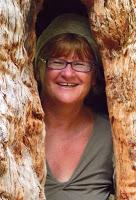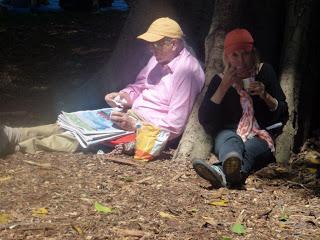
Beatrix Kramlovsky
Our guest this week is the Austrian author and artist, Beatrix Kramlovsky, who is also an avid traveler. In addition to writing novels, short stories, and book reviews, Beatrix teaches literature and creative writing at universities in countries around the world, including Iran, Bulgaria, Germany, Ireland, Turkey, and Cuba. Her travel memoir, Die Erde trägt ein Kleid aus Worten, was published in 2010, and an English version titled Memoirs of a Vagabond will be available in late April. Married with two children, Beatrix lives in Vienna. Visit her website at www.kramlovsky.at.
Richard and Gladys are well into their seventies. Since retiring, they’ve begun volunteering at Australia’s national parks, where they help park rangers host campgrounds, collect entrance fees, do light maintenance, and make sure that visitors follow the rules. They live in a tent for four or five months a year in a park of their choosing, spending at least four weeks at each site. Free of charge, of course. Australia seeks retirees to take on these and similar jobs, just to keep the system going. Richard and Gladys combine a wandering existence with periods of living in one place, a blend that suits them perfectly. And yet they’ve noticed a growing trend among their peers toward a truly nomadic life.
We meet Mary and Tony on Australia’s southwestern coast. They’ve been on the road for three years now, traveling in an enormous caravan (camper) with an all-terrain vehicle hitched to the back. They’re on their way to the city where their kids and Mary’s elderly father live. He won’t be around much longer, and Mary wants to spend time with him in his final months.
“But right afterwards, we’re hitting the road again.” Mary and Tony are in complete agreement on this.
Never again will they be tied down to a fixed location with responsibility for property upkeep and material things. Tony sometimes still works as a truck driver. When he does, they stay in one place for a few months before hitting the road again. Every afternoon, they stop by a river or lake, sit together over coffee and read a book for several hours.
“Admit it,” Mary says, “you can’t find this quality of life back home.”
The couple skypes regularly with their kids, grandkids, and friends. Sometimes, they board a plane and visit their old home, which has lost all sense of familiarity. They have everything they need without taking on the burden of caring for things—and they meet interesting people. Their marriage is stronger and their health better than before they took to the road, while a financial cushion from the sale of their house keeps hard times at bay. Mary and Tony are in their mid-sixties, still young compared to the other retirees I meet.
Australia has much to offer its elderly residents; there is now a travel guide for “grey nomads” as well as lectures, workshops, and websites. For years now, more and more retired Australians are exchanging hearth and home for life on the road, crossing the continent, stopping wherever it pleases them, and moving on when they get tired of a place.

Maggie, 73, and Jeremy, 80, have spent the last ten years on the road. At first, they planned to roam the Outback only for one year. But they enjoyed their travels so much that, once the year was up, they sold their house and invested part of the money in a good caravan. The rest goes to supplement the small pension the couple receives, which they expect will last for five years. They save money by cooking most of their own meals and eating out only on rare occasions. During their travels, they have come to know a number of communities that appreciate their special skills and let them work in exchange for campground fees. Maggie used to teach school, while Jeremy was a structural engineer and once helped renovate a church steeple.
In 2008, Australia launched a program that pairs communities with retirees who are willing to work. No matter what the seniors have to offer, every town in the Outback can use their skills. In return, the helpful nomads receive food coupons or vouchers for the supermarket. Apparently the system quickly became a great success since more and more towns have asked to sign on. However, the program’s continuing existence is threatened because the government agency that gives the towns their funding plans to cut its budget.
“It’s such a shame,” says Michael, who is 79. “Many people work for virtually nothing because they are happy to do so and feel they are contributing to society. But the government talks about the need to save money, even though the country has been raking in more cash than it has done for decades.”
Despite this setback, the gray nomads are traveling the country in ever increasing numbers. Even the prospect of falling ill and ending up in an unfamiliar hospital, far from friends and family, is no deterrent. And yet some veteran travelers have discovered that life on the road is not as cheap as they thought, and they’re seeing their savings shrink faster than expected. Some grey nomads rely on welfare, go hungry, or lack the necessary cash to eat regular meals. No longer able to properly care for themselves, these senior citizens must be accommodated in communities far from home.
In some places, however, I find campgrounds filled almost entirely with retirees. They invite each other over for tea, pitch in with repairs, visit the sick in the small local hospital. They play music, read to each other, and help out in the many nonprofit organizations that perform a vital function in the far-flung, isolated villages.

Travelers in southwestern Australia
“We have worked out a regular route,” says Ann, a 72-year-old widow, as we stand on a Kangaroo Island beach and watch a young pelican stick his head into his mother’s gullet. “We keep meeting up with the same people, who are gradually becoming friends. We see varied landscapes, each prettier than the next, and we keep mentally and physically active. We are learning so many new things. Unlike you Europeans, we live on a continent without a proper winter, which makes travel easier on old bones.”“What about your children?”
We visit them every year and skype a lot. At home, we’d only get on each other’s nerves, watch TV, and gossip about the neighbors. We just get into a rut when things are too comfortable. It would be a shame to waste our lives that way. Arrogant as this may sound, I could not stand living in suburbia, where nothing ever changes and where I get the feeling that it hardly matters whether I even get up in the morning or turn off the TV. My only regret is that we didn’t start traveling at the age of fifty or sixty. We’d have been able to do and see so much more!”
It’s time for her to hit the road again. Her sister, 78, waves from her place at the barbecue. Just like some of the other caravans, hers has a red-lettered sign above the license plate that proclaims: Geriatric Picnic Drive.
* Translated from the German by Heidi Noroozy

